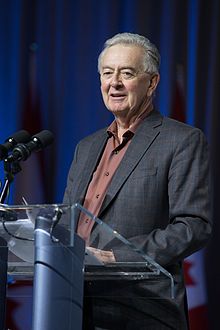Manning Centre
|
The Honourable Preston Manning PC CC AOE |
|
|---|---|

Manning in 2014
|
|
| 33rd Leader of the Opposition | |
|
In office June 2, 1997 – March 26, 2000 |
|
| Monarch | Elizabeth II |
| Preceded by | Gilles Duceppe |
| Succeeded by | Deborah Grey |
| Leader of the Reform Party of Canada | |
|
In office November 1, 1987 – March 25, 2000 |
|
| Preceded by | party created |
| Succeeded by |
Deborah Grey (as Interim leader of the Canadian Alliance) |
| Member of the Canadian Parliament for Calgary Southwest |
|
|
In office October 25, 1993 – January 31, 2002 |
|
| Preceded by | Bobbie Sparrow |
| Succeeded by | Stephen Harper |
| Personal details | |
| Born |
Ernest Preston Manning June 10, 1942 Edmonton, Alberta, Canada |
| Political party | Reform (1987–2000) |
| Other political affiliations |
Canadian Alliance (2000–02) |
| Residence | Calgary, Alberta, Canada |
| Signature | |
Ernest Preston Manning, PC CC AOE (born June 10, 1942) is an Alberta-based conservative Canadian politician. He was a founder and the only leader of the Reform Party of Canada, a Canadian federal political party that evolved into the Canadian Alliance which in turn merged with the Progressive Conservative Party to form today's Conservative Party of Canada. Manning represented the federal constituency of Calgary Southwest in the Canadian House of Commons from 1993 until his retirement in 2002. He served as Leader of the Official Opposition from 1997 to 2000. Upon his retirement he has founded the Manning Foundation for Democratic Education and the Manning Centre for Building Democracy, not-for-profit organizations dedicated to strengthening Canadian democracy in accordance with conservative principles.
Manning was born in Edmonton, Alberta. He is the son of Muriel Aileen (née Preston) and Ernest Manning, Social Credit Party Premier of Alberta between 1943 and 1968 and a Canadian Senator from 1970 to 1983. Preston's grandparents were English immigrants.
Manning grew up in the Garneau district of Edmonton but moved at age twelve with his parents to the family dairy farm east of Edmonton from which he attended a rural school – Horse Hill High School. He enrolled in the honors physics program at the University of Alberta in 1960, but switched after three years to economics and graduated in 1964 with a B. A. in Economics. He sought election to the Canadian House of Commons in the 1965 federal election as a candidate of the federal Social Credit Party, but was defeated.
...
Wikipedia
